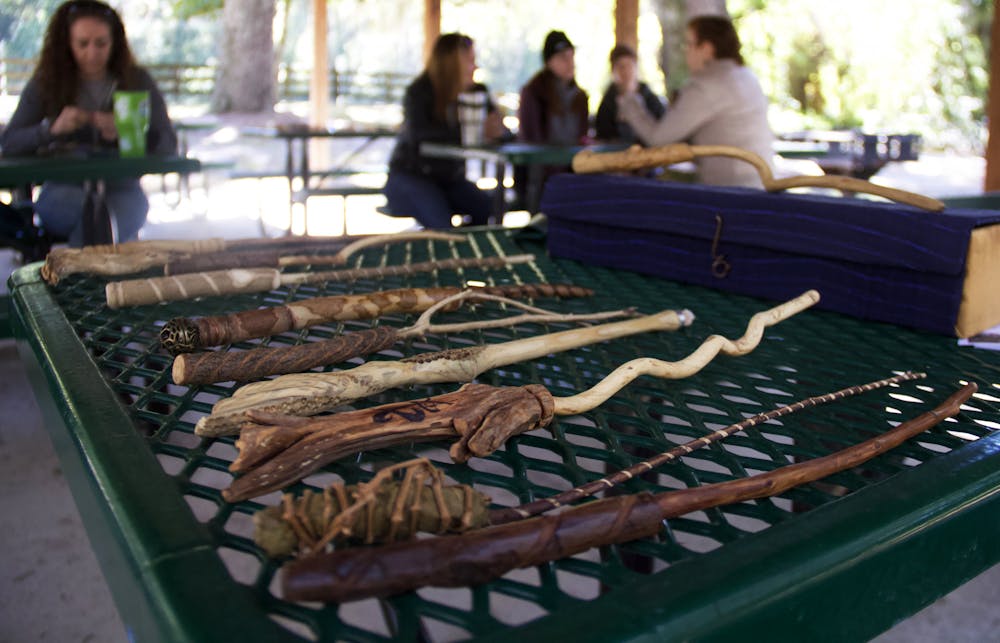Every year, children across the world count down the seconds until they turn 11 years old. They anxiously look at the clock and cross out every boxed-in calendar day that marks the long-awaited passing of time until they’re finally old enough to attend Hogwarts School of Witchcraft and Wizardry.
And then… nothing.
These children disappointedly never receive their letter of acceptance into the mythical school of Hogwarts. They then grow up and lose this magical spark that existed within as they grapple with the real world, rather than the wizarding one of Harry Potter.
The Worthwich School of Wizardry, however, aims to change that.
The self-proclaimed home for misfit wizards made its way into Bivens Arm Nature Park Nov. 14 for a wand-making workshop, where participants were taken through a crash course on wands before being instructed on how to make one.
Maiko Mushanokoji, founder and co-owner of the company, said there are four basic elements that all wandmakers use: materials, size, design and core.
Although much has changed since their initial class in 2016, such as the variety of woods which has grown extensively, these four elements have remained the exact same throughout.
While each element is significant, Mushanokoji said the core is the most important component in finalizing the wand. The core is what connects the user to the wand, and they suggest picking something that is personally magical to the user, such as someone’s piece of hair or a guitar string.
After explaining this to the class, Worthwich headmaster and wand master Mushanokoji instructed the participants to pick a piece of wood from their various options along with a stem for the handle of the wand.
“We collect and harvest and process all of our own wood,” the other co-owner and founder, Faye Fearless, said. “At the very first classes, I think we only had maybe five kinds of wood. Now in each class, we do at least 10 varieties. Sometimes we have closer to 15 varieties of wood to each class.”
As explained, each type of wood has different properties for different people. Each person must find the wood which matches their personality best.
For example, “Elm wands prefer owners with presence, magical dexterity, and a certain native dignity,” as stated on the notecard next to the pile of elm sticks.
After the participants sifted through these notecards and decided on their perfect wood match, they proceeded to sand the ends of the wood until it fit in the handle snugly. Before the wand designs were finished with a final glaze, the illustrious core was placed on the wand.
Five years, various cities, and thousands of wands later, Fearless, the asserted potions master at Worthwich, is still amazed at how people conjure up such unique designs for their wands.
While it may seem like a children’s event, Fearless said this is far from the truth.
“All of our events are designed especially for adults,” she said. “It's a place for adults to play… you can play pretend and you can imagine, even go all crazy and no one's going to judge you because that's what kids do.”
At the end of the workshop, Fearless and Mushanokoji led a dedication ceremony where students “prepare it [their wands] for magical use.”
Along with workshops, the pair of owners also host a three-day event every year called Wizarding Weekend, where a group of students are fully immersed in the Worthwich experience. While on school grounds, students lodge in cabins and take a full curriculum of magical arts classes, such as potions and divinations.
In part, what makes this community of “misfits” so welcoming is the fact that they are completely immersive. As Fearless said, this magical world they’ve created allows people to make friends and form bonds that have extended well beyond the scopes of Worthwich.
“That was kind of the idea behind it,” she said. “It’s just a place for people to come and hang out with other people who like magic and not be judged for that.”
Contact Luigi Bencosme at lbencosme@alligator.org
Luigi is a third-year media production, management, and technology major at UF and is currently one of the multimedia editors for the Alligator. Prior to his editor position, Luigi was a staff writer under the Avenue as well as the podcast producer for Rowdy Magazine. In his free time, he likes to read up and investigate the most obscure fun facts that would interest no one else.






